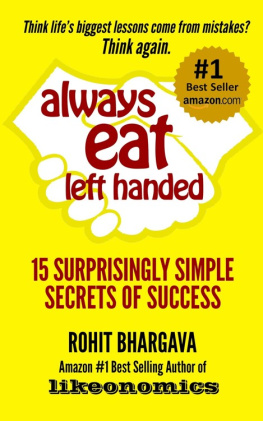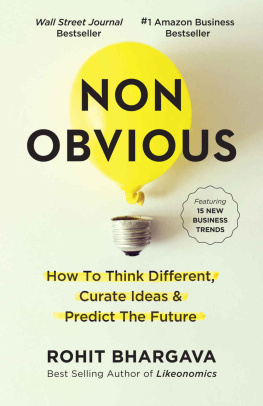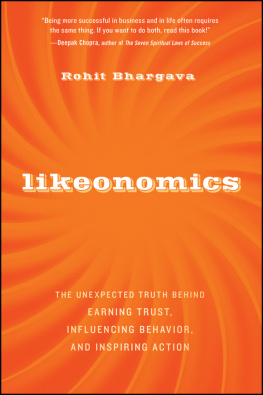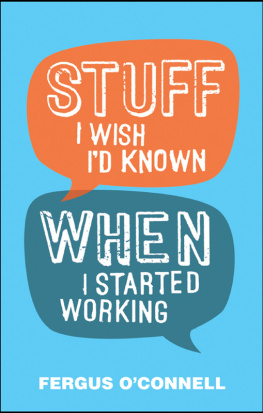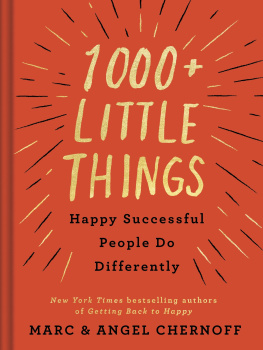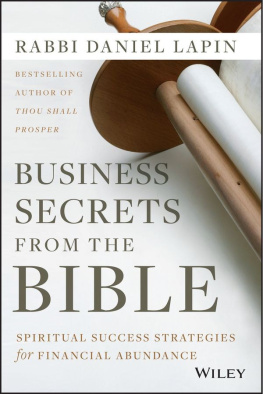Prologue
Whatever happens, I cant let them see the inside of my book.
This wasnt what I expected to be thinking as I was getting ready for the kickoff interview to launch my first book. It was May of 2008, just days before Personality Not Included would go on bookstore shelves and already my months of planning were being pushed off track.
The day before, my publisher McGraw-Hill had sent me the dust jacket cover of the book in advance of the start of my planned book tour, with a short apology that the actual book wasnt quite ready yet. I had a cover, no book, and my first big interview planned in less than 12 hours.
I was starting to panic. Should I cancel? Try to reschedule? Do the interview without the book?
Finally I had an idea. I started combing through my bookshelf to see if I had another book that was about the same size and dimensions as the dust jacket. Soon, I found one and slid the dust jacket the publisher had sent me over the book.
It fit perfectly.
Almost immediately, my mind filled with all the worst case scenarios. What if I had to open the book during the interview? What if I had to read something from it? I was already imagining that moment when my entire charade would be exposed for the online world to see.
Still, I decided to go ahead and do the interview anyway.
So the next day I showed up to the interview and proudly held up my book cover, wrapped carefully on top of a worn copy of Made To Stick . I made it through the interview that day without my secret being exposed. All it took was a little luck and the ability to find a small solution to a small problem. It turns out these kinds of micro-solutions to small problems are all around us.
Club Soda and Micro-Solutions
Club Soda may be the ultimate micro-solution to annoyingly common problem. Most of us know that it is useful for immediately getting stains out of clothing but thats not what it was originally created to do. Someone had to discover that use, and then start sharing it. Over time, it has become one of those lessons that many of us learn at some point during our journey towards adulthood.
Will club soda change your life? Probably not.
Still, knowing this one little useful detail can make a difference in dozens of small moments over the course of your life. It may not change your destiny, but it certainly might change your day. Or someone else you may have the change to help with their own spill or mishap someday.
Micro-solutions are like that. They are tiny lessons, fixes or life hacks that change small parts of your daily routine or help you overcome challenges. Any one of them alone may only have a small effect on your life. But together, learning these lessons can prepare you for success. They can make the difference between winning and losing.
Micro-solutions can change everything.
The aim of this book is to offer you 15 ideas like that. It is a compilation of some of the hidden, counterintuitive and sometimes baffling secrets that can help inspire success. They are each shared through real stories, minimal buzzwords and are told as briefly as I could make them.
Some of these ideas may offer interesting reminders of a principle that you have seen at work in your own life. Others may reinforce a deeper truth that changes the way you interact with others or prepare yourself for success.
Heres a quick summary of all the lessons without the context or stories behind them. Ill admit Im using a writers trick here to invite you to read more about the principles and why each one might have some value for you in your own life.
So if my shameless attempt to pique your interest works take the journey with me and read on!
- Play the Cello.
- Overlap Your Legos.
- Wear Jeans.
- Avoid Cauliflower.
- Build A Bookshelf.
- Take The Window Seat.
- Use A Sharpie.
- Keep It Emotional.
- Interrupt Often.
- Ignore Job Descriptions.
- Be Forgetful.
- Never Serve Burnt Toast.
- Lose Your Watch.
- Let Ideas Travel.
- Walk In High Heels.
Table Of Contents
Introduction
I used to wish I was left handed.
Actually, its more accurate to say I wish I was left footed so I could more easily play on the left side during the many soccer games I played growing up. I was reminded of that childhood wish at a networking event several years ago. It was an upscale affair with waiters to pass around food along with plenty of wine and cocktails.
In my worried haste that afternoon, I realized quickly that I had skipped lunch. At that time, I would often avoid having food at networking events because it could get messy, and it is always hard to juggle a plate and a drink and eat while also greeting people.
That day, I was too hungry.
So I loaded my plate of food held it in my hands. I quickly realized that shaking hands would be a messy effort if I started eating with my right hand so I switched. As I ate with my left, I realized it made it much easier to shake hands with my right. But that one simple switch changed more than my ability to shake hands.
As soon as I started eating left handed, I no longer avoided conversation while I was eating. I didnt have that awkward moment of having to clean off my hands, or be forced in moments of high flu season to be a hand sanitizer guy who followed some sort of weird cleansing ritual after every interaction.
Eating left handed made me more approachable. It changed the way I thought about networking events and how I might enjoy them. After that, I started focusing on making deeper connections with fewer people at every event instead of collecting business cards. Those connections started introducing me to their colleagues and I started making connections events in a way I never had before.
Always eating left handed changes everything.
Why Mistakes Are Overrated
If there were a step by step guide on how to write a book about being successful, one of the requirements would probably be to have at least a chapter on the power of making mistakes. Successful people love to romanticize mistakes and the lessons they offer about life.
This isnt a book about making mistakes. In fact, you could describe it as a book about AVOIDING mistakes.
But wait a minute isnt making mistakes an important part of learning? The most successful people in the world often say so. In fact, if you read a recap from some of the most memorable commencement speeches ever delivered to graduating seniors from high school or college every year, youll see four pieces of advice that are shared over and over again:
- Take risks
- Never give up
- Do what you love
- Make mistakes
Despite their overuse, what I like about the first three pieces of advice is that they are very positive. They encourage you to dream bigger. But encouraging someone to make mistakes seems like the opposite kind of advice. Its like admitting failure. What kind of person wants to make mistakes?
All Mistakes Arent Created Equal
The thing about mistakes is we all tend remember the big ones we make in our lives and where they lead us. Those are the ones we learn lifes biggest lesson from, and the ones that we based our advice on. The truth is, no one writes a book about those stupid microscopic tiny mistakes we make that impact our lives every day. Those are the ones we scratch our heads after and wonder how we could have been so stupid.
There are mistakes that change our lives, and then there are mistakes we wish we never made.
The interesting thing about those mistakes we regret is that most of us quickly find ways to train ourselves out of making them by solving micro-problems with micro-solutions. Not only do we all do this every day, but we rely on our ability to get better and better at doing it to deal with the challenges of our daily lives.
Next page
